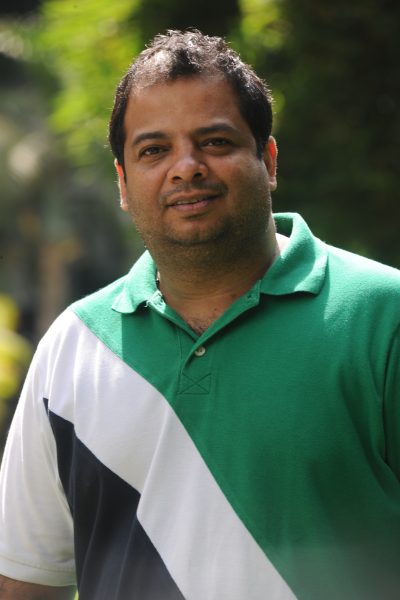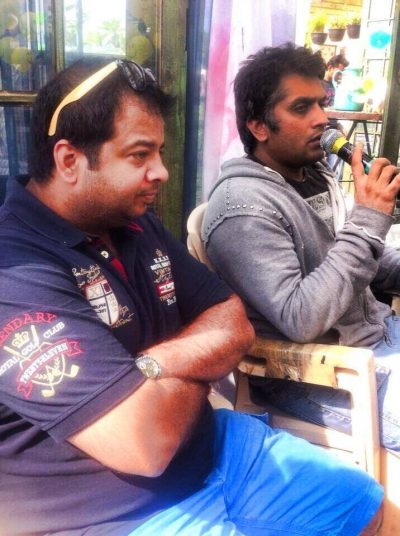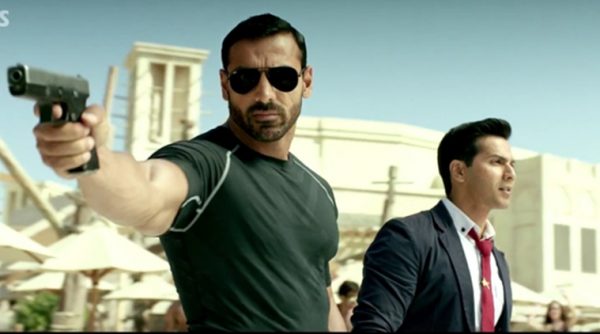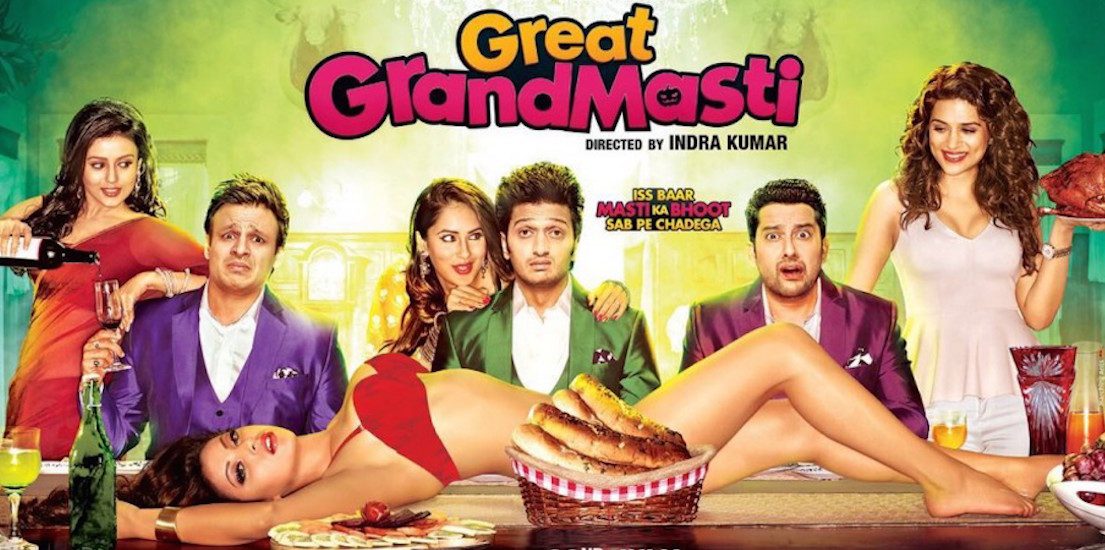Just want the producer to make money & audience to have fun: Tushar
When during his school days he struggled in reading and writing, no one really realized he had dyslexia. Even today he is unable to write or read properly yet he has churned out films that have been commercial hits. Hailing from a family where his grandfather and father both were into the distribution of films, he feels that films are in his blood. Indian film writer Tushar Hiranandani who was once the clapper boy of Mann has written films like Masti, Grand Masti, Double Dhamaal, Houseful 2, ABCD, Main Tera Hero, ABCD 2, Ek Villain etc. While speaking to Pandolin, he talks about his recent release Great Grand Masti and other forthcoming films.

Writer Tushar Hiranandani
From Masti to Great Grand Masti, how did the ideas first start and how have they grown with each film?
Masti was written by Milap Zaveri and me. We started with the genre that was not done by anyone. It took off really well that time. We got lucky to have good star cast to do it and as we had a great star cast, it didn’t look that vulgar. I was clapper boy for Indra Kumar (director) in Mann, Rishtey and Aashiq and suddenly I was the writer for him in Masti. On the sets of the films that I did as a clapper boy, I used to give him suggestions. Luckily I met Milap (Zaveri, writer) and we collaborated to write Masti.
When we decided to write the second part of Masti, Kyaa Kool Hai Hum and Kyaa Super Kool Hai Hum had already come out with the same genre. We wanted to surpass that. So we really went mad in the second part. When you look at Great Grand Masti, you’ll realize that it is the maximum that you can do with a sex comedy. By the time we were planning to do the third part, we had already shown a lot in the last two parts and were just thinking that what else could we do. Then I came up with the story of the ghost and it became a new genre called ‘horrex’. Whoever I narrated the idea to, they immediately started laughing so I knew that it will do good. In fact, Riteish (Deshmukh, actor) didn’t want to do another sex comedy if it wasn’t a great idea. That’s why Riteish had been saying the same everywhere that he really loved the idea.
I have been complimented by my favourite director Sooraj Barjatya that he really liked Masti and Grand Masti.
What kind of deliberate efforts do you make to make sure that each part is different from the previous ones?
It is always the story. In every part, the story has always evolved. In all the sex comedies that you look around, they don’t really have any story. I’m not degrading anyone’s work but it is just fun and gags. But Masti franchise has a proper storyline in every part and that is why people connect with it. I know people will laugh at me but families, young couples and group of ladies have gone to seen Masti together. People go in groups to see the film and they have a ball. In fact, I have been complimented by my favourite director Sooraj Barjatya that he really liked Masti and Grand Masti.
While writing a sex comedy, what are the key points you keep in mind? Are there any boundaries that you set for yourself?
Like I said the story has to be new. If the story is just about jokes and gags, after a point the audience will get bored. All the Masti films have done well because everything including the dialogues, script and performances were good.
I don’t keep any boundaries while writing any story. I just stick to the story. The only boundary that I set for myself is that I should not deviate from the story.
Despite doing lot of business, the Masti franchise and other sex comedies are also criticised for its content. What has led to this contrasting reaction? What has made sex comedies click with the Indian audience who treated these subjects like a taboo?
Indians have always liked good films. Be it Masti, Grand Masti or Great Grand Masti, they were good films. I don’t think we show anything to degrade anyone. We just want the audience to have fun. We always give a lesson in the film. For instance in Masti, the husbands go out to cheat but then they realise and come back to their wives. I think it is a great message to give out and that is why people like it so much.
To just sum up about the whole contrasting reaction I would just say that there are always a group of people who are not supporting many things. Every product will have a group of people who are against it. I write movies for the audience to enjoy it. I don’t want to make everybody happy. I just want the producer to make money, the audience to have fun and the director to have a hit film.
Besides writing adult comedies, you also have some entertainers and different films to your credit like ABCD, Ek Villain, Atithi Tum Kab Jaoge, Houseful 2, Double Dhamaal etc. Genres don’t seem to be a restriction. Which one do you enjoy the most and why?
I write every scene with my director. I sit with the director and start writing the particular genre with him. For a dance film, I sat with Remo D’Souza and wrote a dance film. I’ll sit with Mohit Suri and write a romantic film with him. When I sit with Indra Kumar, I will make a sex comedy. For me, there is no genre. There is just a movie that I need to enjoy. If I don’t enjoy, how would the audience the enjoy it? Also, I enjoy my rapport with the director the most. I connect with the director and I write for my director. That is how my movies are made.

Tushar with director Mohit Suri on the sets of Ek Villain
Comedy is a large part of your filmography. What goes into making people laugh?
Comedy was a large part of most of my films at one point of time but now I’m doing different stuff. Great Grand Masti is the only recent comedy film of mine. Making people laugh & to be funny. And it comes as a personality. I think I’m little funny and I keep myself simple by not thinking too much of myself. I just enjoy myself and that is why audience enjoy my films. All my upcoming releases – Rohit Dhawan’s Dishoom, Remo D’Souza’s The Flying Jatt and ABCD 3 and Mohit Suri’s Half Girlfriend are different from each other.
What are the points to keep in mind while writing a comedy film?
Just enjoy yourself in writing any film. Till you are not enjoying yourself, no one else will. There are not boundaries. You can do anything as long as it sounds sensible to you and you are having fun. You can lie to others but you can’t lie to yourself. Don’t try to please people. Just please yourself.
Your next release Dishoom is an action adventure. How do you approach a story where action forms a key part?
You never think what exactly will form the key part. One just simply thinks about the genre that the director wants. After that, you come up with the idea and that is what happened in Dishoom’s case. I came up with the idea and Rohit (Dhawan, director) liked it. Once you get the story, you get everything done. The concept has to be new today.
Also, do you write with stars in mind and fit them later into the story?
I never think my story keeping the actors in mind. I always write the film according to the characters.
In an action film, is it important to have characters that are larger than life because it is the trend now where regular characters are eventually shown as the big heroes?
I’ve not really written those kinds of films. I have only written small films that have done well. I have not worked with bigger stars as such.

A still from Tushar’s next film Dishoom
Last year you also joined Balaji Motion Pictures Limited (BMPL) as Head of Development. How has that influenced idea generation and content development for you as an individual?
As a writer, I’m a different person. But working with Balaji has been different and great too. Just that I meet a lot of youngsters these days and know about their fresh ideas. I update myself by meeting people. I come to know what the world is thinking as now I keep meeting the interesting writers.
What are the kinds of films that you prefer to watch?
I like to watch every good film. There is not an obsession about the genre. Since childhood I use to see every kind of genre except horror films.
Which films have influenced your thought process?
For me, Anand and 3 Idiots are my favourite films. These are my bibles. Till I was not married, I just used to spend my new year’s seeing 3 idiots everywhere. In fact, whenever my parents used to go for holidays they would just take my sister and I used to not go. I would just take the money and see video cassettes. I would watch three movies every day – be it South, English, Punjabi, Gujarati etc.
What more would you like to explore in Indian cinema?
I’m very happy where I’m today in the industry. I get to do different work and I’m having good fun. Had I only been writing comedies, I would have finished long back and burnt out. The reason that I’m doing different stuff is helping me sustain myself.
Could you talk a bit about your initial background when you started as a clapper boy. Since your father had some experience in the distribution of films, did it help a bit?
My father didn’t want me to come in this line as he had lost a lot of money. Perhaps because my grandfather and father both were distributors, therefore it was in my blood. In fact, I’m a dyslexic. I can neither write a single word nor can ever read properly. I have an assistant for that. People laugh at me. But I remember things that I see and it just falls in place. I never use to do well in school as I was dyslexic and no one understood this at that time.
The way you had to struggle in reading or writing, did you even have to struggle in the industry?
Everyone has to struggle. It is not easy. You have to really struggle to make it. After achieving something also you have to struggle to just be there. You have to keep on working.



